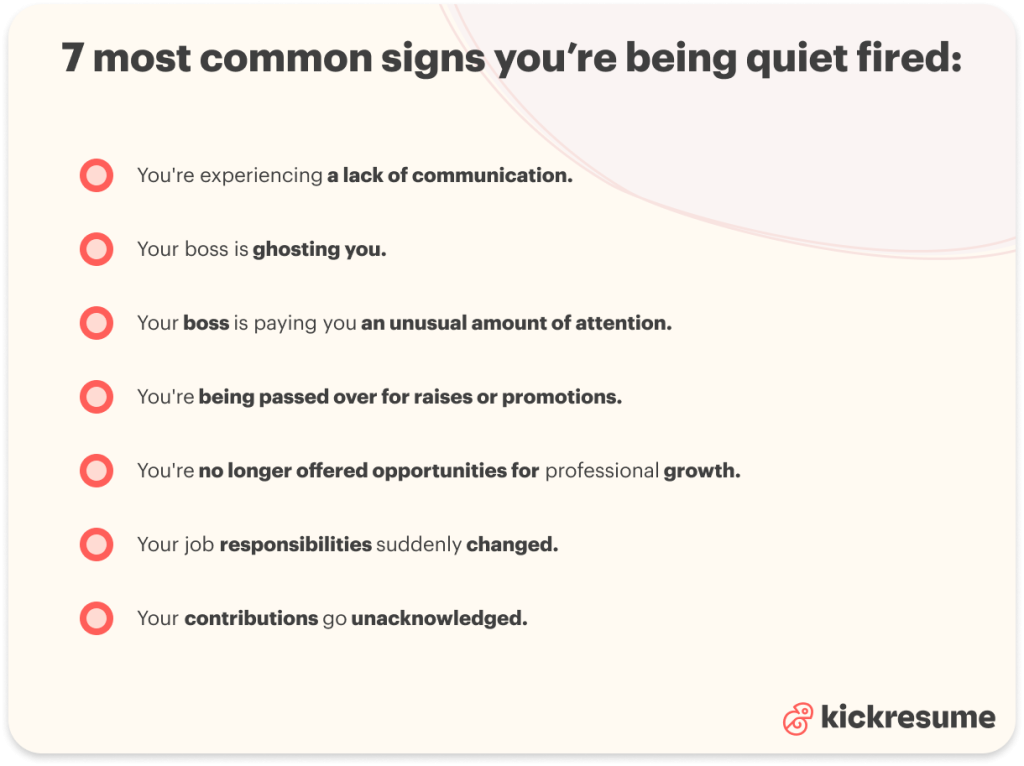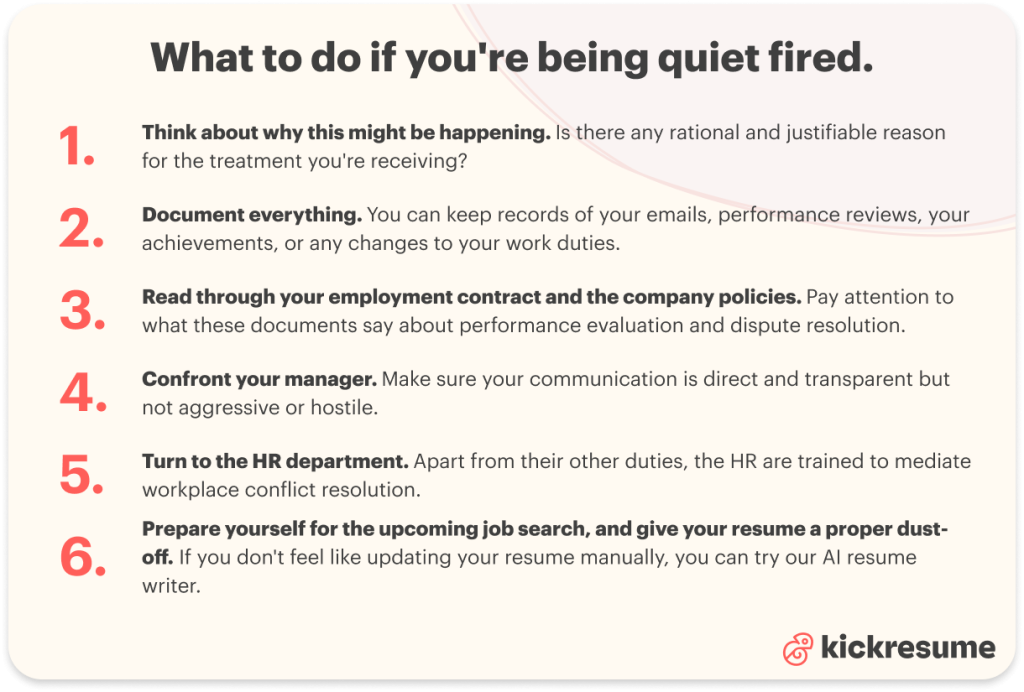Lately, the term 'quiet firing' has been making the rounds in office chats and online forums, and for a good reason.
A staggering 80% of participants of a recent LinkedIn News poll, reported that they had either experienced quiet firing firsthand or witnessed it happening to their colleague.
Still, people often fail to notice the warning signs that they're being quiet fired until it's too late.
So, if you haven't heard about quiet firing yet, it's time to perk up your ears!
After all, it might be happening to you as we speak.
Read our article and find out:
- What is quiet firing;
- How to recognize quiet firing signs;
- Quiet firing vs quiet quitting;
- Whether is quiet firing illegal;
- What steps to take if you're being quiet fired.
What is quiet firing?
Quiet firing is when employers use subtle methods to make the workplace feel less welcoming for some employees. They aim to make these employees feel less valued or like they no longer fit in, nudging them toward the decision to resign on their own.
The term 'quiet firing' came into existence in 2022, and quickly became popular among social media users.
Despite what you might think, quiet firing isn't a new phenomenon. It's an age-old practice where employers try to push their employees out of their jobs without having to actually fire them.
But why do companies and employers do this? It might seem strange, but there are practical reasons.
By quietly encouraging employees to leave on their own, companies can avoid:
- paying the employees their severance pay;
- potential wrongful termination lawsuits;
- bad reputation in case mass layoffs are a regular occurrence.
How common is quiet firing?
Very common – in fact, 29% of managers openly admit to having quiet fired an employee in the past, based on a JobSage survey.
But the fun doesn't end here!
Additionally, 56% of managers state that they have employees they wish they could fire but can't due to company policies. Or, not the formal way at least.
Indeed, when it comes to quiet firing, no one seems to be safe.
Can you hear that sound? That's your bubble bursting. Sorry.
Are you being quiet-fired? 7 quiet firing signs
Truth is, many employees don't realize they're being quiet fired until it's too late.
Why? Well, the signs are often so subtle you may mistake them for simply not being your boss' favourite person. Quiet firing isn't bullying or harassment in the true sense.
Still, there are signs you can look out for to spot whether you're being quiet fired:
- You're experiencing a lack of communication.
- Your boss is ghosting you.
- Your boss is paying you an unusual amount of attention.
- You're being passed over for raises or promotions.
- You're no longer offered opportunities for professional growth.
- Your job responsibilities suddenly changed.
- Your contributions go unacknowledged.

#1 You're experiencing a lack of communication.
Do you find yourself suddenly out of the loop? No more updates, check-ins or other team correspondence? As a consequence, you may feel isolated and paranoid. It might be the case that your manager hopes the discomfort will become too much for you to bear.
#2 Your boss is ghosting you.
When you started working for the company, your boss was open to regular discussions over your performance, your goals, and your future development. Now, s/he can't even answer your emails. Plus, your questions go unanswered, and your input is no longer sought in decisions that end up affecting your work.
#3 Your boss is paying you an unusual amount of attention.
Yes, excessive attention from your direct supervisor may be preferable than none at all, but no less damning. Over-the-top scrutiny, micromanagement, or criticism are never pleasant to receive. Sometimes, these are all for a good reason. But without any rational and constructive explanation, such attention can make you feel incompetent and frustrated.
#4 You're being passed over for raises or promotions.
Are you no longer receiving the usual salary increases or bonuses without getting a clear, justifiable reason why this is happening? Well, this might be another gentle nudge towards the door. Similarly, if the promotion you were hoping for lands in the lap of your colleague who doesn't perform as well as you do, it's time to get suspicious.
#5 You're no longer offered opportunities for professional growth.
Look back at the last year or so of your employment. Have you received invitations to any form of training, conferences, or workshops? You haven't? And what about your colleagues? If you're the only one without new challenges, chances are your manager no longer includes you in their future plans.
#6 Your job responsibilities suddenly changed.
You may find yourself in one of these two scenarios. Either, you're drowning in an unusual amount of work and impossibly tight deadlines. Or, conversely, you may be given tasks that are below your skill level. Both can make you feel incompetent or burnt out.
#7 Your contributions go unacknowledged.
No matter how significant your achievements are, you don't get that pat on the shoulder anymore. Or worse! The pat lands on the wrong shoulder and credit for your hard work is given to others. In the face of unfairness, anyone would feel demoralized!
Bonus: Your supervisor asks you to write a blog article about quiet firing.
… o_o
Even though these are the most common strategies to oust you from your current seat, they are by far not the only ones! For example, you can check these 20 warning signs you're about to be fired.
Quiet firing vs quiet quitting
"Quiet quitting" refers to employees not going above and beyond in their work tasks anymore, while "quiet firing" is a tactic used by employers to encourage employees to resign by making their work conditions uncomfortable.
We've already looked at quiet firing in detail. Now, let's quickly summarize the characteristics of quiet quitting:
- Despite the word "quitting," employees don't actually want to quit their jobs.
- Instead, they check out mentally and emotionally.
- Employees choose to do the bare minimum required by their job roles.
- They continue to fulfill their basic job duties but stop participating in activities such as volunteering for additional projects or working overtime.
- Quiet quitting can result in decreased productivity, damaging the team spirit, and hurting the overall performance of the department.
But where did quiet quitting and quiet firing come from?
The popularity of both of these terms can be traced back to the pandemic, which has contributed to rising frictions between the employers and their employees.
And, thanks to the trend of quiet quitting, 1 in 4 managers are now more suspicious of their employees and their commitment to companies.
We can therefore say that quiet firing might be the employers' response to quiet quitting. In other words: if you don't scratch my back, I won't scratch yours.
Is quiet firing illegal?
Undoubtedly, the question on everybody's lips is “Is quiet firing illegal?”.
Unfortunately, the answer is no.
While its certainly unethical and unprofessional, quiet firing as such isn't against the law. In fact, employers often resolve to quiet firing precisely because it allows them to avoid legal consequences.
However, some of the tactics used to encourage employees to leave their job could cause legal issues for the employer. Especially, if they can be seen as:
- harassment,
- discrimination,
- or violation of labour laws and regulations (different from country to country).
If your experience could be viewed as any of the above, you could try to build a case against constructive dismissal. Provided that you have a lawyer and proof of your accusations, of course. And that might be a problem.

What to do if you're being quiet fired.
If you've experienced any of the quiet firing signs, don't freak out and hand in your resignation letter just yet.
If you do that, you'll give up your rights to receive severance. And a good severance package, depending on your company's policies, can get you through weeks, even months of unemployment.
But that doesn't mean that you have to be a sitting duck! Even though the situation doesn't look good, there are still some steps you can take:
- Think about why this might be happening. Firstly, do a little bit of self-reflection. Am I engaging in any negative behaviour? Am I doing a good job? Do I meet deadlines? There may actually be a rational and justifiable reason for the treatment you're receiving.
- Document everything. Keep records of your emails, performance reviews, your achievements, or any changes to your work duties. Anything that suggests you're being deliberately pushed towards resignation. This may give you something tangible to lean on in case you confront your superior.
- Read through your employment contract and the company policies. Pay attention to what these documents say about performance evaluation and dispute resolution. Both of these can be useful.
- Confront your manager. The best antidote to quiet is communication. But keep your emotions in check! Make sure your communication is direct and transparent but not aggressive or hostile.
- Turn to the HR department. You can also ask the HR for assistance. Apart from their other duties, the HR are trained to mediate workplace conflict resolution.
- Prepare yourself for the upcoming job search, and give your resume a proper dust-off. It's always best to be prepared. If it comes to it, you'll have all it takes to find a company that will treat you right.
And, if you don't feel like updating your resume manually, you can try out our AI resume writer. Not only will it suggest new resume phrasing, keywords and formatting, it can also proofread and correct any mistakes or typos that might've otherwise escaped your attention.
And, it'll treat you with the respect and decency you deserve. Promise!
Key takeaways: Quiet Firing
Quiet firing is a leadership misconduct where employers use subtle strategies to make their employees to quit their job without actually having to fire them. they do so by fostering a hostile and negative workplace.
In brief, even though the term “quiet firing” didn't appear until 2022, it's by no means a novel concept.
Employers may resort to quiet firing to avoid legal repercussions, financial obligations like severance pay, and the potential damage to their reputation from outright termination layoffs.
If you're not sure whether you're being quiet fired, look for these 7 quiet firing signs:
- You're experiencing lack of communication.
- Your boss is ghosting you.
- Your boss is paying you an unusual amount of attention.
- You're being passed over for raises or promotions.
- You're no longer offered opportunities for professional growth.
- Your job responsibilities suddenly changed.
- Your contributions go unacknowledged.
While quiet firing isn't outright illegal, it borders on unethical and can lead to legal issues if it involves harassment, discrimination, or breaches labour laws.



